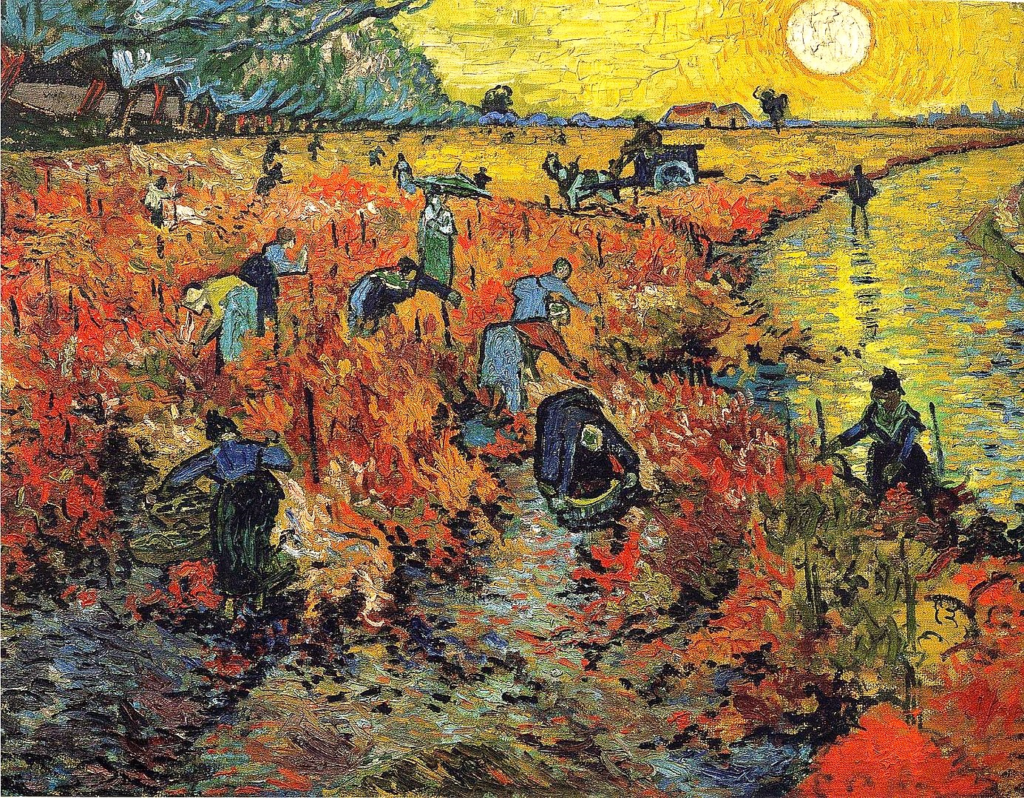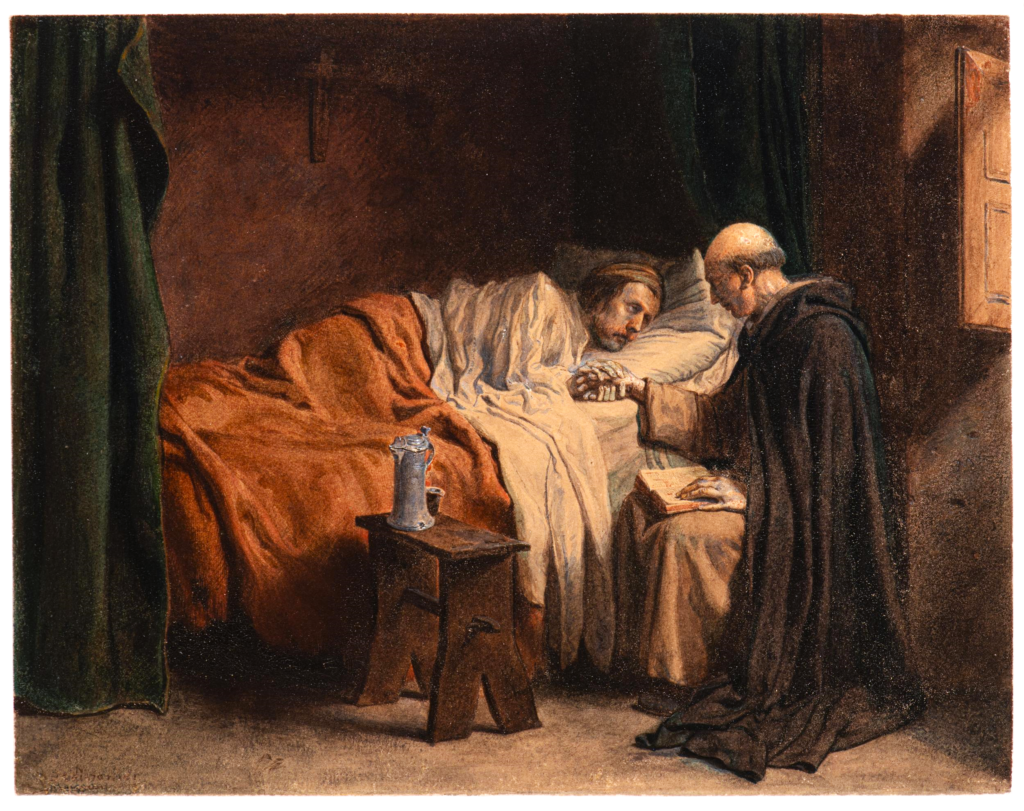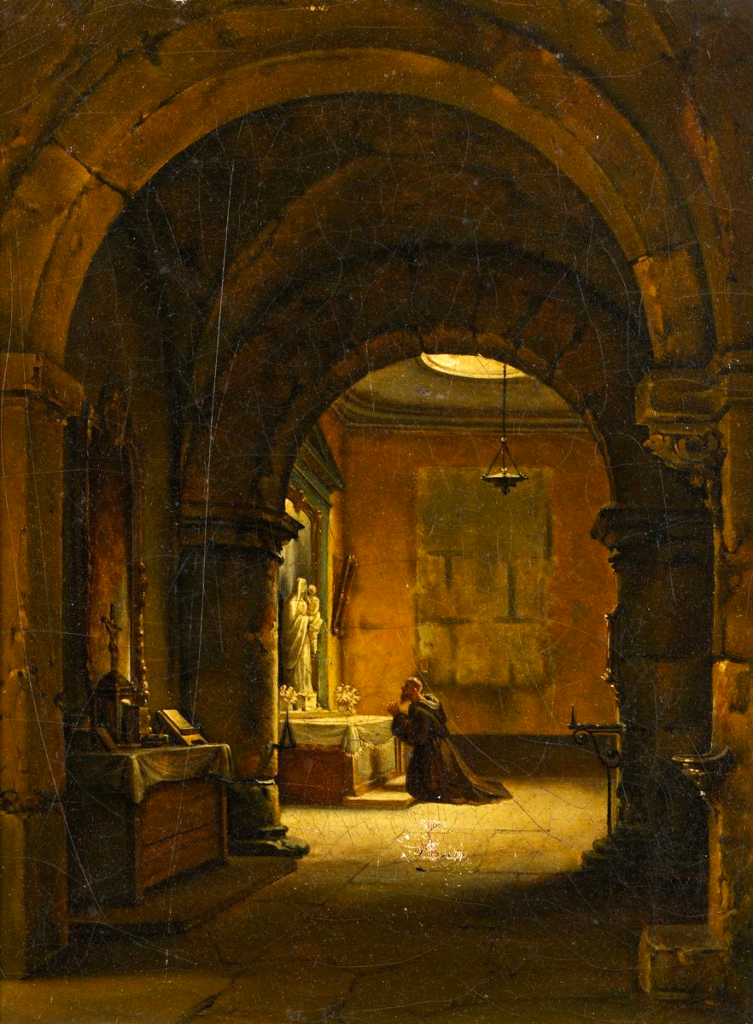Translation of the Holy Gospel According to Matthew
At that time Jesus spoke to his disciples this parable: The kingdom of heaven is like to an householder who went out early in the morning to hire laborers into his vineyard. And having agreed with the laborers for a penny a day, he sent them into his vineyard. And going out about the third hour, he saw others standing in the market place idle, and he said to them: Go you also into my vineyard, and I will give you what shall be just. And they went their way. And again he went out about the sixth and the ninth hour: and did in like manner. But about the eleventh hour he went out and found others standing, and he said to them: Why stand you here all the day idle? They say to him: Because no man has hired us. He said to them: Go you also into my vineyard. And when evening was come, the lord of the vineyard said to his steward: Call the laborers and pay them their hire, beginning from the last even to the first. When therefore they were come that came about the eleventh hour, they received every man a penny. But when the first also came, they thought that they should receive more: and they also received every man a penny. And receiving it they murmured against the master of the house, saying: These last have worked but one hour, and thou hast made them equal to us that have borne the burden of the day and the heats. But he answering said to one of them: Friend, I do thee no wrong: did thou not agree with me for a penny? Take what is thine and go thy way: I will also give to this last even as to thee. Or, is it not lawful for me to do what I will? Is thy eye evil, because I am good? So shall the last be first, and the first last. For many are called, but few chosen.
From Saint Pope Gregory the Great’s Homilies on the Gospels, No. 19
Two points must therefore hold our particular attention. The first is that since there are many called, but few chosen, no one should be too sure of him, because even if he has already been called to the faith, he does not know if he is worthy of the eternal Kingdom. The second is that no one should allow himself to despair of his neighbor, even though he would see him plunged into vice, because no one knows the treasures of divine mercy.
I go, my brethren, to tell you a story recently arrived, so that, if you recognize yourself sinners from the bottom of your heart, you love more of the mercy of Almighty God. This year, in my monastery near the Blessed Martyrs John and Paul, a brother came to lead the religious life; he was received piously, and lived even more piously. His brother followed him to the monastery: by the body, not by the heart. Having a horror of monastic life and habit, he lived as a guest in this monastery. His manners removed him from the life of the monks, but he could not stop living in the monastery, because he had neither what to look after nor what to live. His depraved nature was a burden to all, but all tolerated him with patience for his brother’s sake. Proud and luxurious, he did not know that a life had to follow that of this world, and he laughed at those who wanted to tell him about it. Thus, living with the habit of the century in the monastery, he was light in words, unstable by his passions, proud in his spirit, sought in his dress and dissipated in his actions.
But last July, he was struck by this epidemic of plague you know. Arrived at the last end, he found himself on the point of giving up the ghost. Death had already seized the extremities of his body; there was only life in his chest and tongue. The brothers, gathered around him, supported him with their prayers in his last moments, as much as God granted them. But suddenly he saw a dragon come to him ready to devour him, and he cried aloud: “Here they gave me food for the dragon. Your presence alone prevents him from devouring me; why make me wait? Let him do it. Let him devour me. “And as the brethren urged him to make the sign of the cross on him, he answered, as far as his strength would permit,” I want to sign myself, but I can not because the dragon prevents me; the drool of his mouth floods my face, my throat suffocates under his mouth. Behold, he crushes my arms, and my head is already in his mouth. “As he said that pale, trembling and dying, the brothers began to pray with redoubled fervor, so to come to the help of the one held by him. hold of the dragon. Then, suddenly released, the dying man cried aloud: “God be praised! He has gone now, he has gone out; in front of your prayers, the dragon who had taken me fled. “
Immediately he made a vow to serve God and become a monk; Since then, fevers continue to oppress him, and he still suffers a lot. He has been saved from death, but he has not yet been fully restored to life. Because he was a long time slave of his iniquity, he endured a long illness, and his hard heart is burned by the even harder fire of the atonement. Divine Providence thus wished that a prolonged illness should burn long vices. Who would ever have believed that God would keep this man alive for conversion? Who can consider such a great mercy from God? Behold, a young debauched man saw at his death the demon he had served during his life; and this vision, far from making him lose his life, allowed him to know him whose slave he had made, that he might resist him, and that if he resisted, he would triumph over them. He who before possessed him without seeing him, was finally given the opportunity to see him, so that he would no longer be possessed by him. What language could describe the entrails of divine mercy? What spirit would remain stunned by such riches of goodness? It is these riches of divine goodness that the psalmist had in view when he said: Help me, I will sing to you by my songs, because you are, O God, my refuge, O my God, my mercy (Psa 59:18). Having considered of what suffering is woven human life, the psalmist called God his help; and because at the end of the present tribulation, God welcomes us into eternal rest, he still calls it his refuge. The psalmist also considered that God sees our evil deeds, but supports them, and that despite our faults, he is patient in order to lead us to reward by penance; so he did not want to content himself with saying that God is merciful, he has called it Mercy in person: “O my God, my mercy.”
Let us put before our eyes the evil that we have committed; let us acknowledge with what sweet patience God supports us; Let us consider the entrails of his paternal goodness: not only is he indulgent in his faults, but he also promises the kingdom of heaven to those who, after their faults, do penance. And from the bottom of our heart, let’s say everyone: O my God, my Mercy, who live and reign, three in unity and one in the Trinity, forever, forever and ever. Amen.



